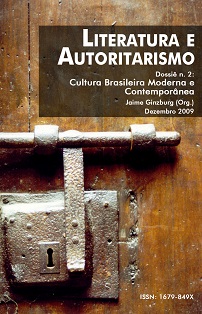Two confessional novels: a comparison of São Bernardo with La Familia de Pascual Duarte
DOI:
https://doi.org/10.5902/1679849X74599Keywords:
Neo-naturalism, Confessional novel, Brazil, SpainAbstract
This paper analyzes and compares a Brazilian neo-naturalist novel with one written in Spain. Despite the geographic and cultural distance between the authors, Graciliano Ramos and Camilo José Cela, and the striking differences in their backgrounds, there are remarkable similarities in their novels that reflect the aftermath of civil war and dislocation of society that both authors suffered. The narrative structure and literary antecedents of both novels are explored. Gracilianos’ interpretation of the genre includes regionalism and romanticism, while Cela’s is colored by tremendismo. In both there are significant departures from the Naturalism of Zola.
Downloads
References
CANDIDO, A. Ficção e Confissão. Ensaios sobre Graciliano Ramos. Rio de Janeiro: Editora 34, 1999.
CELA, C.J. La familia de Pascual Duarte. 20ª edn., Barcelona: Ediciones Destino, S.A., 1989.
CIRURGIÃO, A. Premonição e Simbolismo em S. Barnardo de Graciliano Ramos. Inti (Storrs, CT) . v. 3, 1976. pp. 37-51.
RUIKSHANK, J. Albert Camus and the Literature of Revolt. London: Oxford University Press, 1959. pp. 6-7 quoted by D. W. McPheeters, Camilo José Cela. New York: Twayne Publishers, 1969.
EAGLETON, T. Literary Theory: An Introduction. Minneapolis: University of Minnesota Press, 1983.
FERRER, O.P. La literatura española tremendista y su nexo con el existencialismo Revista Hispánica Moderna. v. 22, 1958 p.298, cited by D. W. MCPHEETERS, Camilo José Cela. New York: Twayne Publishers, 1969.
FURST, L.R. and Peter N. SKRINE. Naturalism. London: Methuen & Co. Ltd., 1971.
GIBSON, I. Cela, el hombre que quiso ganar. Madrid: Aguilar, 2003.
MACDONALD, M.B. The influence of Emile Zola in the novels of Benito Pérez Galdós produced during the years 1881-1885. Ph.D. Dissertation in Spanish Literature, University of Minnesota, Minneapolis,1959.
MARTINS, W. The Modernist Idea. trans. Jack E. Tomlins. New York: New York University Press, 1970, quoted by Celso LEMOS DE OLVEIRA. Understanding Graciliano Ramos. Columbia, South Carolina: University of South Carolina Press, 1988.
MAZZARA, R.A. Graciliano Ramos. New York: Twayne Publishers Inc., 1974.
MCPHEETERS, D. W. Camilo José Cela. New York: Twayne Publishers, 1969.
OLVEIRA, C. L. de. Understanding Graciliano Ramos. Columbia, South Carolina: University of South Carolina Press, 1988.
ORTEGA, J. Antecedentes y naturaleza del tremendismo en Cela. Hispania. 48, 1 1965. pp. 21-28.
PATTISON, W. El naturalismo español. Madrid: Editorial Gredos, S.A., 1965.
PEREIRA DA SILVA, H. Graciliano Ramos. Río de Janeiro: Gráfica Tupy Ltda., 1954. p. 76. cited by Marie F. SOVEREIGN. Pessimism in Graciliano Ramos. Luso-Brazilian Review. v.7, n.1, 1970. p. 58.
PÉREZ, J. Camilo José Cela Revisited: The Later Novels. New York: Twayne Publishers, 2000.
RAMOS, G. São Bernardo. Rio de Janeiro: Editora Record,1996.
RODRÍGUEZ, A. “Esbozo de un tema moderno: la antropofagia porcina.” Papers on Language and Literature. v. 2, n.1, 1966. pp. 269-273.
RIMMON-KENAN, S. Narrative Fiction: Contemporary Poetics. London: Methuen, 1983. cited by Manfred JAHN. Narratology: A Guide to the Theory of Narrative. Available at http://www.uni-koeln.de/~ame02/pppn.htm#N2.2. Accessed on 22 apr. 2009.
SOVEREIGN, M.F. Pessimism in Graciliano Ramos. Luso-Brazilian Review. v. 7, n. 1 1970. pp. 57-63.
SUSSEKIND, F. Literatura e vida literária: polêmicas, diários e retratos. ed. Jorge Zahar. Rio de Janeiro: 1985. cited by Nancy T. Baden. The Muffled Cries: The Writer and Literature in Authoritarian Brazil, 1964-1985. Lanham: University Press of America, Inc.,1999.
Downloads
Published
How to Cite
Issue
Section
License
DECLARAÇÃO DE ORIGINALIDADE E EXCLUSIVIDADE E CESSÃO DE DIREITOS AUTORAIS
Declaro que o presente artigo é original e não foi submetido à publicação em qualquer outro periódico nacional ou internacional, quer seja em parte ou na íntegra. Declaro, ainda, que após publicado pela Literatura e Autoritarismo, ele jamais será submetido a outro periódico. Também tenho ciência que a submissão dos originais à Literatura e Autoritarismo implica transferência dos direitos autorais da publicação digital. A não observância desse compromisso submeterá o infrator a sanções e penas previstas na Lei de Proteção de Direitos Autorais (nº 9610, de 19/02/98).






